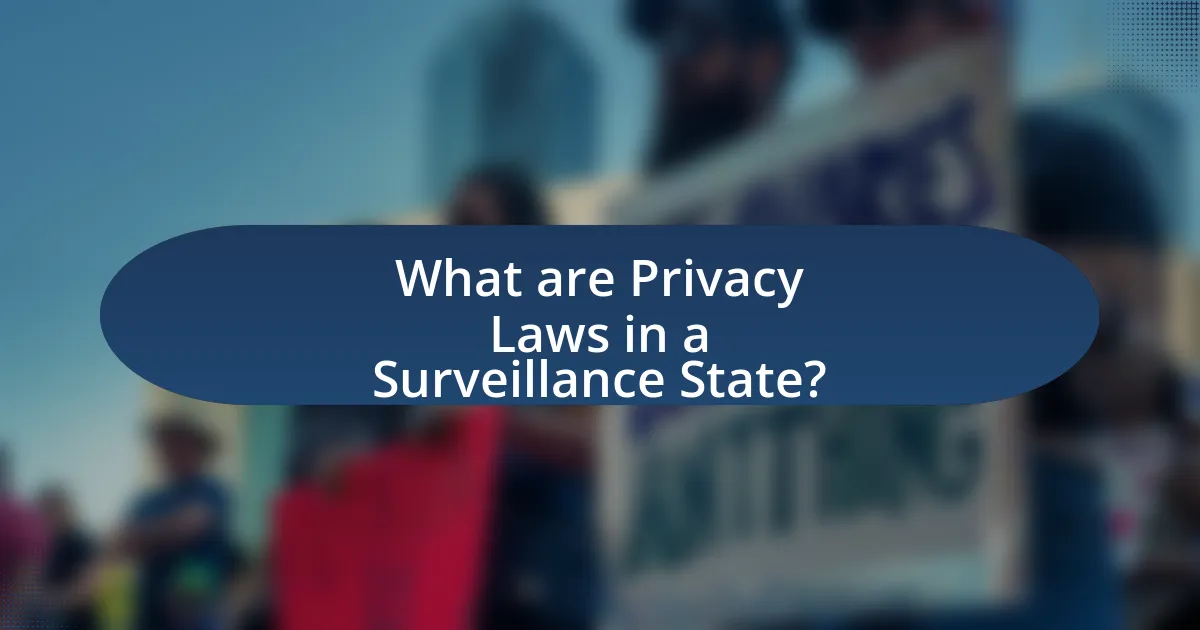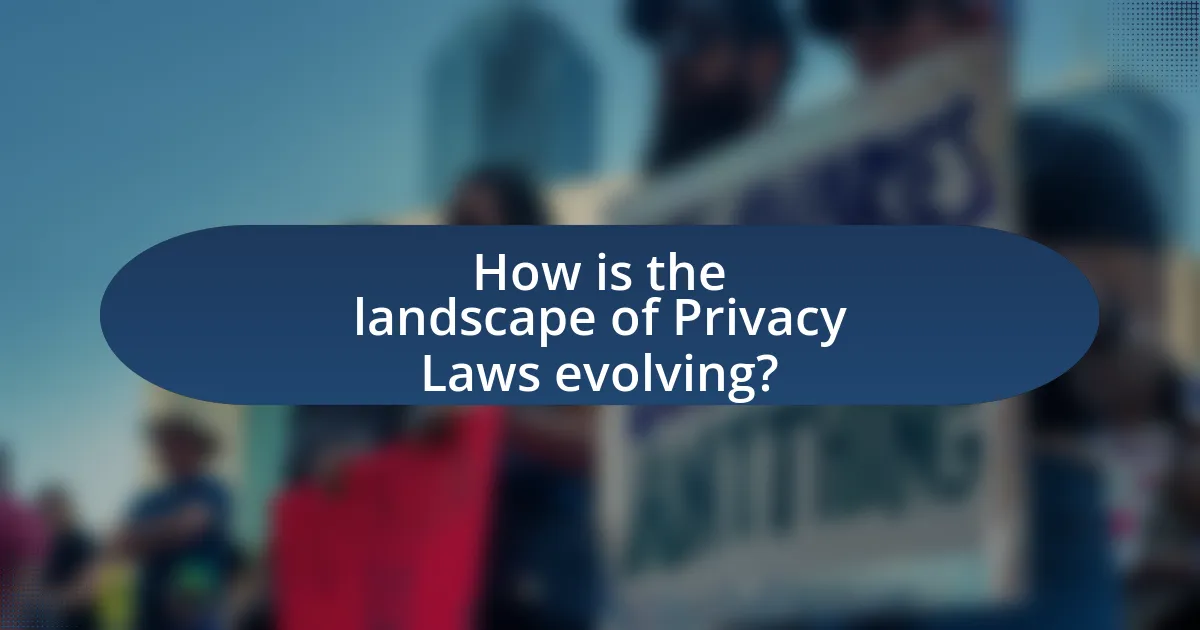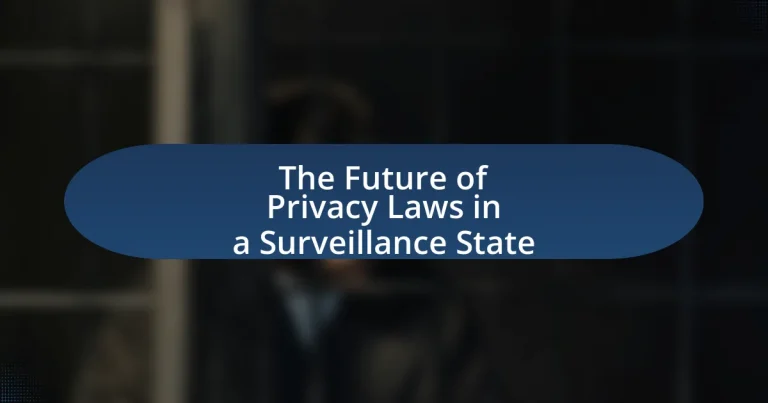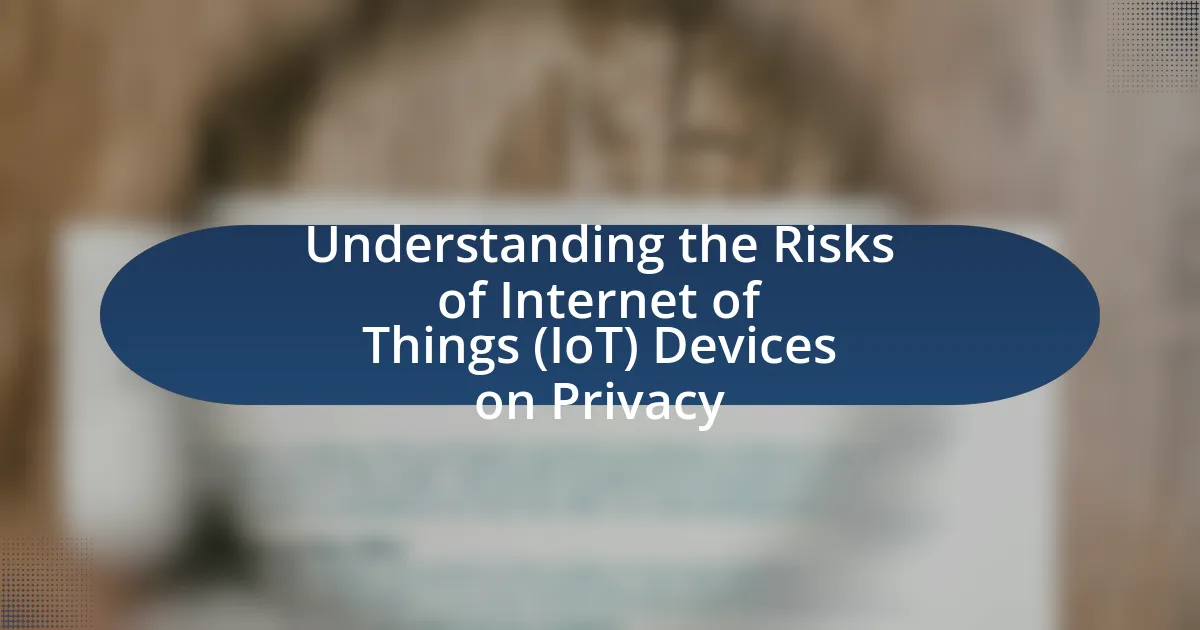The article examines the evolving landscape of privacy laws within surveillance states, focusing on the legal frameworks designed to protect individual rights against excessive monitoring and data collection. It highlights the differences in privacy laws across various countries, particularly contrasting authoritarian regimes with democratic nations, and discusses the importance of privacy laws in safeguarding citizens from government overreach. Key topics include the rights individuals possess under these laws, the challenges faced in enforcement, the impact of technology, and the role of public opinion and activism in shaping privacy legislation. The article also explores how cultural attitudes influence privacy expectations and the practical steps individuals can take to protect their privacy in a digital age.

What are Privacy Laws in a Surveillance State?
Privacy laws in a surveillance state are legal frameworks designed to protect individuals’ personal information from excessive monitoring and data collection by government entities and private organizations. These laws aim to establish guidelines for data collection, usage, and sharing, ensuring that citizens have rights regarding their personal data. For instance, the General Data Protection Regulation (GDPR) in the European Union sets strict rules on data processing and grants individuals rights such as access to their data and the right to be forgotten. In a surveillance state context, these laws are crucial for balancing national security interests with individual privacy rights, as seen in debates surrounding legislation like the USA PATRIOT Act, which expanded surveillance capabilities but raised concerns about civil liberties.
How do Privacy Laws differ across various surveillance states?
Privacy laws vary significantly across surveillance states, primarily influenced by the extent of government surveillance and the legal frameworks established to protect individual rights. For instance, in China, the government enforces strict surveillance measures with minimal privacy protections, allowing extensive data collection without consent. In contrast, countries like Germany implement robust privacy laws, such as the General Data Protection Regulation (GDPR), which mandates strict guidelines for data handling and grants individuals significant control over their personal information. This disparity highlights how the balance between state surveillance and individual privacy rights is shaped by national policies and cultural attitudes towards privacy, with some states prioritizing security over personal freedoms while others emphasize the protection of individual rights.
What are the key characteristics of privacy laws in authoritarian regimes?
Privacy laws in authoritarian regimes are characterized by limited individual rights, extensive government surveillance, and a lack of legal recourse for citizens. These laws often prioritize state security over personal privacy, allowing authorities to monitor communications and collect personal data without consent. For example, countries like China implement strict regulations that enable the government to access and control digital information, often justified by national security concerns. Additionally, the absence of independent judicial systems in these regimes means that citizens have little to no means to challenge privacy violations, reinforcing the state’s power over individual freedoms.
How do democratic nations approach privacy laws in the context of surveillance?
Democratic nations typically approach privacy laws in the context of surveillance by establishing legal frameworks that balance national security interests with individual privacy rights. For instance, the General Data Protection Regulation (GDPR) in the European Union sets stringent guidelines on data collection and processing, emphasizing the protection of personal data and requiring transparency from organizations. Additionally, countries like Canada have implemented the Personal Information Protection and Electronic Documents Act (PIPEDA), which mandates consent for data collection and provides individuals with rights over their personal information. These laws reflect a commitment to safeguarding privacy while allowing for necessary surveillance measures, such as those justified under public safety concerns.
Why are Privacy Laws important in a Surveillance State?
Privacy laws are crucial in a surveillance state because they protect individual rights and freedoms against unwarranted government intrusion. In a surveillance state, where monitoring and data collection are pervasive, privacy laws serve as a safeguard to ensure that citizens maintain control over their personal information. For instance, the General Data Protection Regulation (GDPR) in the European Union establishes strict guidelines on data collection and processing, reinforcing the principle that individuals should have a say in how their data is used. This legal framework not only promotes transparency but also holds entities accountable for misuse of personal data, thereby fostering trust in governmental and corporate practices.
What rights do individuals have under privacy laws?
Individuals have several rights under privacy laws, including the right to access personal data, the right to rectify inaccurate data, the right to erase data, the right to restrict processing, and the right to data portability. These rights are established to empower individuals in controlling their personal information and ensuring its protection. For instance, the General Data Protection Regulation (GDPR) in the European Union explicitly outlines these rights, mandating organizations to comply with individuals’ requests regarding their personal data. This legal framework aims to enhance transparency and accountability in data handling practices, thereby reinforcing individuals’ autonomy over their personal information.
How do privacy laws protect citizens from government overreach?
Privacy laws protect citizens from government overreach by establishing legal frameworks that limit the government’s ability to collect, use, and disclose personal information without consent. These laws, such as the Fourth Amendment in the United States, provide constitutional protections against unreasonable searches and seizures, ensuring that citizens have a right to privacy in their personal affairs. Additionally, regulations like the General Data Protection Regulation (GDPR) in Europe impose strict requirements on how personal data can be processed, giving individuals control over their information and the right to seek redress if their privacy is violated. These legal protections serve as a check on government power, preventing arbitrary surveillance and ensuring accountability.
What challenges do Privacy Laws face in a Surveillance State?
Privacy laws face significant challenges in a surveillance state due to the pervasive monitoring of individuals by government and private entities. The extensive collection of data often occurs without explicit consent, undermining the foundational principles of privacy legislation. For instance, in countries with robust surveillance programs, such as China, the state employs advanced technologies to track citizens, making it difficult for privacy laws to enforce individual rights effectively. Additionally, the rapid advancement of technology outpaces legislative efforts, leading to gaps in regulation that allow for exploitation of personal data. This situation is exacerbated by the lack of transparency and accountability in surveillance practices, which further complicates the enforcement of privacy laws.
How does technology impact the enforcement of privacy laws?
Technology significantly enhances the enforcement of privacy laws by enabling more efficient monitoring, data collection, and compliance mechanisms. Advanced tools such as artificial intelligence and machine learning allow regulatory bodies to analyze vast amounts of data quickly, identifying potential violations of privacy regulations. For instance, the General Data Protection Regulation (GDPR) in Europe has been supported by technology that automates compliance checks and facilitates reporting, thereby increasing accountability among organizations. Furthermore, technologies like blockchain provide transparent and immutable records of data transactions, which can help in verifying compliance with privacy laws. These advancements illustrate how technology not only aids in enforcing existing privacy laws but also shapes the development of new regulations to address emerging challenges in data protection.
What role do public opinion and activism play in shaping privacy laws?
Public opinion and activism significantly influence the development and reform of privacy laws by raising awareness and advocating for stronger protections. Public sentiment often drives legislative agendas, as seen in the aftermath of high-profile data breaches and surveillance scandals, where citizens demand accountability and transparency from governments and corporations. For instance, the Cambridge Analytica scandal in 2018 led to widespread public outcry, prompting lawmakers in various jurisdictions to propose stricter data protection regulations, such as the General Data Protection Regulation (GDPR) in the European Union. Activist groups, such as the Electronic Frontier Foundation, mobilize communities to advocate for privacy rights, effectively shaping policy discussions and legislative outcomes. This interplay between public opinion and activism creates a feedback loop that compels lawmakers to respond to constituents’ concerns, ultimately leading to the evolution of privacy laws in response to societal values and expectations.

How is the landscape of Privacy Laws evolving?
The landscape of privacy laws is evolving towards greater regulation and enforcement in response to increasing public concern over data privacy and surveillance. Recent developments include the implementation of comprehensive data protection regulations, such as the General Data Protection Regulation (GDPR) in Europe, which has set a global standard for privacy rights and data handling practices. Additionally, various jurisdictions are enacting their own privacy laws, such as the California Consumer Privacy Act (CCPA), which grants consumers more control over their personal information. These changes reflect a growing recognition of the need to balance technological advancements with individual privacy rights, as evidenced by the rising number of privacy-related lawsuits and enforcement actions against companies that fail to comply with these regulations.
What recent trends are influencing the future of Privacy Laws?
Recent trends influencing the future of privacy laws include the rise of data protection regulations, increased public awareness of privacy issues, and advancements in technology such as artificial intelligence and big data analytics. Data protection regulations, exemplified by the General Data Protection Regulation (GDPR) in Europe, have set a precedent for stricter privacy laws globally, compelling organizations to prioritize user consent and data security. Public awareness has surged due to high-profile data breaches and scandals, leading to demands for greater transparency and accountability from companies regarding personal data usage. Additionally, technological advancements necessitate ongoing adaptations in privacy laws to address challenges such as data collection methods and surveillance practices, which are increasingly scrutinized by both lawmakers and the public.
How are international agreements shaping national privacy laws?
International agreements are significantly influencing national privacy laws by establishing common standards and frameworks that countries adopt to ensure compliance with global norms. For instance, the General Data Protection Regulation (GDPR) enacted by the European Union has set a benchmark for privacy protections, prompting countries worldwide to revise their laws to align with its stringent requirements. As a result, nations such as Brazil and India have introduced comprehensive data protection laws that reflect GDPR principles, demonstrating the direct impact of international agreements on domestic legislation. This trend is further supported by the increasing emphasis on cross-border data flows and the need for harmonization in privacy regulations, which encourages countries to adopt similar legal frameworks to facilitate international trade and cooperation.
What impact do emerging technologies have on privacy legislation?
Emerging technologies significantly influence privacy legislation by necessitating updates to legal frameworks that address new data collection and processing methods. For instance, advancements in artificial intelligence and big data analytics have led to increased concerns about surveillance and data misuse, prompting lawmakers to consider stricter regulations. The General Data Protection Regulation (GDPR) in the European Union exemplifies this response, as it was enacted to enhance individual privacy rights in light of technological advancements. Additionally, the rise of biometric data usage has spurred discussions around the need for specific laws to protect such sensitive information, highlighting the ongoing evolution of privacy legislation in response to technological developments.
What role do courts play in the evolution of Privacy Laws?
Courts play a critical role in the evolution of privacy laws by interpreting existing statutes and setting legal precedents that shape the understanding of privacy rights. Through landmark rulings, such as the U.S. Supreme Court’s decision in Katz v. United States (1967), courts have established the principle that individuals have a reasonable expectation of privacy in certain contexts, thereby influencing legislative frameworks. Additionally, courts address conflicts between privacy rights and governmental interests, as seen in cases involving surveillance practices, which further refines the legal landscape surrounding privacy. These judicial interpretations and decisions not only clarify the application of privacy laws but also prompt legislative bodies to adapt and create new laws in response to evolving societal norms and technological advancements.
How have landmark cases influenced privacy rights?
Landmark cases have significantly shaped privacy rights by establishing legal precedents that define the scope and limitations of individual privacy. For instance, the Supreme Court case Katz v. United States (1967) established the “reasonable expectation of privacy” standard, which protects individuals from warrantless wiretaps, thereby reinforcing the notion that privacy extends beyond physical spaces. Additionally, the case of Roe v. Wade (1973) recognized a woman’s right to privacy in making medical decisions, further expanding the interpretation of privacy rights in personal matters. These cases illustrate how judicial rulings have created a framework that influences legislation and societal norms regarding privacy, ultimately leading to stronger protections against government intrusion and the establishment of privacy as a fundamental right.
What is the significance of judicial interpretations of privacy laws?
Judicial interpretations of privacy laws are significant because they shape the application and enforcement of these laws in real-world scenarios. Courts play a crucial role in defining the scope of privacy rights, influencing how laws are understood and implemented. For instance, landmark cases such as Katz v. United States established the “reasonable expectation of privacy” standard, which has guided subsequent rulings and legislative actions. These interpretations can either expand or limit individual privacy rights, directly impacting citizens’ protections against government surveillance and data collection practices. Thus, judicial interpretations serve as a critical mechanism for adapting privacy laws to evolving societal norms and technological advancements.
How do cultural attitudes affect the future of Privacy Laws?
Cultural attitudes significantly influence the future of privacy laws by shaping public expectations and legislative priorities regarding personal data protection. For instance, societies that prioritize individualism and personal freedom, such as those in Western countries, tend to advocate for stronger privacy protections, leading to comprehensive regulations like the General Data Protection Regulation (GDPR) in the European Union. Conversely, cultures that emphasize collectivism and national security may support more lenient privacy laws, allowing for greater surveillance and data collection by governments, as seen in countries like China. This divergence in cultural values directly impacts how privacy laws are formulated, enforced, and perceived, ultimately determining the balance between individual rights and state interests in various jurisdictions.
What differences exist in privacy expectations across cultures?
Privacy expectations vary significantly across cultures, influenced by historical, social, and legal contexts. For instance, in Western cultures, particularly in the United States and many European countries, there is a strong emphasis on individual privacy rights, often enshrined in laws such as the General Data Protection Regulation (GDPR) in Europe, which grants individuals extensive control over their personal data. Conversely, in many Asian cultures, such as in China, collective societal interests may take precedence over individual privacy, leading to more acceptance of surveillance and data sharing by the state. Research by the Pew Research Center indicates that cultural attitudes towards privacy can shape how citizens respond to government surveillance, with some cultures viewing it as a necessary measure for security, while others see it as an infringement on personal freedoms.
How can cultural shifts lead to changes in privacy legislation?
Cultural shifts can lead to changes in privacy legislation by altering societal attitudes towards data protection and individual rights. For instance, as public awareness of data breaches and surveillance increases, citizens may demand stronger privacy protections, prompting lawmakers to respond with updated legislation. A notable example is the introduction of the General Data Protection Regulation (GDPR) in the European Union, which was influenced by growing concerns over personal data misuse and a cultural shift towards valuing privacy. This regulation reflects a significant change in legal frameworks, driven by the collective demand for enhanced privacy rights in response to evolving cultural norms surrounding technology and data security.

What practical steps can individuals take to protect their privacy?
Individuals can protect their privacy by implementing strong password management practices, utilizing encryption tools, and being cautious about sharing personal information online. Strong passwords, which are at least 12 characters long and include a mix of letters, numbers, and symbols, significantly reduce the risk of unauthorized access; studies show that 81% of data breaches are linked to weak passwords. Encryption tools, such as VPNs and secure messaging apps, safeguard data transmission, making it difficult for third parties to intercept communications. Additionally, individuals should regularly review privacy settings on social media platforms and limit the amount of personal information shared publicly, as 70% of users are unaware of their privacy settings, leading to potential data exposure.
What tools and strategies are available for personal privacy protection?
Tools and strategies for personal privacy protection include the use of virtual private networks (VPNs), encryption software, privacy-focused web browsers, and secure messaging applications. VPNs, such as NordVPN and ExpressVPN, mask users’ IP addresses and encrypt internet traffic, making online activities more private. Encryption software, like VeraCrypt, secures files and communications, ensuring that only authorized users can access sensitive information. Privacy-focused web browsers, such as Brave and Firefox with privacy extensions, block trackers and ads, enhancing user anonymity. Secure messaging applications, like Signal and WhatsApp, utilize end-to-end encryption to protect conversations from unauthorized access. These tools and strategies are essential in mitigating risks associated with data surveillance and enhancing individual privacy in a digital landscape.
How can individuals utilize technology to enhance their privacy?
Individuals can utilize technology to enhance their privacy by employing tools such as virtual private networks (VPNs), encrypted messaging apps, and privacy-focused web browsers. VPNs encrypt internet traffic, making it difficult for third parties to monitor online activities. Encrypted messaging apps, like Signal or WhatsApp, protect communications from unauthorized access through end-to-end encryption. Privacy-focused web browsers, such as Brave or Firefox with privacy extensions, block trackers and ads, reducing data collection. According to a 2021 report by the Electronic Frontier Foundation, using these technologies significantly decreases the risk of personal data exposure and enhances user control over their information.
What are best practices for maintaining privacy in a digital age?
Best practices for maintaining privacy in a digital age include using strong, unique passwords for each account, enabling two-factor authentication, and regularly updating software to protect against vulnerabilities. Strong passwords reduce the risk of unauthorized access, while two-factor authentication adds an extra layer of security, making it harder for attackers to gain entry. Regular software updates patch security flaws, which is crucial as cyber threats evolve. According to a 2021 report by the Cybersecurity & Infrastructure Security Agency, 85% of data breaches involve weak or stolen passwords, highlighting the importance of these practices in safeguarding personal information.
How can citizens advocate for stronger Privacy Laws?
Citizens can advocate for stronger privacy laws by actively participating in public discourse, engaging with lawmakers, and supporting organizations that promote privacy rights. By attending town hall meetings, writing letters to representatives, and utilizing social media platforms, individuals can raise awareness about privacy issues and influence policy decisions. Research indicates that grassroots movements, such as the Electronic Frontier Foundation’s campaigns, have successfully led to legislative changes by mobilizing public support and demonstrating the demand for enhanced privacy protections.
What role does public awareness play in privacy advocacy?
Public awareness is crucial in privacy advocacy as it empowers individuals to understand their rights and the implications of surveillance. Increased public knowledge leads to greater demand for transparency and accountability from governments and corporations regarding data practices. For instance, studies show that when citizens are informed about privacy issues, they are more likely to support legislation aimed at protecting personal data, such as the General Data Protection Regulation (GDPR) in Europe, which was influenced by widespread public concern over data privacy. Thus, public awareness not only drives advocacy efforts but also shapes the development and enforcement of privacy laws in a surveillance state.
How can individuals engage with policymakers to influence privacy legislation?
Individuals can engage with policymakers to influence privacy legislation by actively participating in public consultations, submitting comments on proposed regulations, and advocating through organized campaigns. Public consultations allow individuals to voice their opinions directly to lawmakers, while submitting comments on proposed regulations provides a formal avenue for feedback. Organized campaigns, such as petitions or grassroots movements, can amplify individual voices and demonstrate widespread public support for specific privacy issues. According to a 2021 report by the Electronic Frontier Foundation, grassroots advocacy has been effective in shaping privacy laws by mobilizing community support and drawing attention to legislative proposals.





